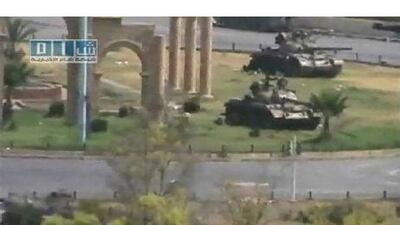NEW YORK // The UN chief said the Syrian president, Bashar Al Assad, has "lost all humanity" as the UN Security Council held new talks yesterday on the Syrian government's deadly crackdown on protests.
With the 15-nation council now under mounting pressure to take a stand on the worsening violence in Syria, Ban Ki-moon, the UN secretary general, vented his growing anger at Mr Al Assad's refusal to acknowledge international criticism.
"Since the beginning of this situation, I have issued many statements, I have spoken to President Assad several times, and I have expressed my sincere wish and genuine wish that he should genuinely address these issues in a peaceful manner," Mr Ban told a small group of reporters.
Highlighting weekend violence in which about 140 people were killed in a military offensive on Hama and other towns, including at least 24 people on the opening day of Ramadan,- Mr Ban said: "This is a totally unacceptable situation. He [Assad] must be aware that under international humanitarian law, this is accountable. I believe that he lost all sense of humanity."
Three more civilians were killed in Hama yesterday, including two brothers, Khaled and Fateh Kanil, who died when pro-Assad "shabbiha" militiamen fired at their food-laden car, two residents, one of them a doctor, said.
They said a brief riot appeared to have broken out late on Monday at Hama's main prison.
Two shabbiha militia buses were seen heading there at night and smoke rose from the compound as the militiamen shouted "God, Syria, Bashar, only" from inside.
"There is damage to the northern section of the jail and some say burnt bodies of prisoners were taken out of the complex," one of the residents said.
Tanks pounded residential neighbourhoods across Hama, the scene of a 1982 massacre, after evening prayers on Monday, the first day of Ramadan, the Muslim fasting month, witnesses said.
State news agency Sana said "hundreds of masked gunmen on motorbikes" had set fire to the main law court in Hama on Monday afternoon and had also vandalised much of the building.
Human rights campaigners said assaults by Assad's forces across Syria on Monday and yesterday had killed at least 27 civilians, including 13 in Hama, where troops and tanks began a violent operation to regain control on Sunday.
Yesterday, European nations distributed the text of a new draft resolution on Syria, but Russian and Indian envoys said it was barely different from a version they have been rejecting for the past two months.
"It is not new," said Russia's UN ambassador, Vitaly Churkin.
The Indian envoy, Hardeen Singh Puri, said: "There has been no change to the text which was on the table, there has been some technical update."
"Our position is very clear, I think the council needs to pronounce itself. Just how the council pronounces itself, in what way, with what degree of emphasis requires a discussion," said Mr Puri, president of the council for August.
Russia and China, two of the five permanent council members with veto powers, had threatened to block past attempts to pass a resolution. Brazil, India and South Africa had also spoken out against a resolution or statement.
After the new violence at the weekend, all Security Council countries have expressed concern there is now wider acceptance that the body must act, diplomats said.
Some diplomats say it is more likely the Security Council will now try to agree on a less formal statement on Syria, with no warning of UN action.
In Washington, US-based Syrian activists met Hillary Clinton, the US secretary of state, to discuss what the State Department calls "the urgent situation" in Syria. Barack Obama, the US president, called the latest attacks "outrageous".
Italy became the first EU member to pull its ambassador from Damascus yesterday, although the EU has been tightening sanctions, imposing asset freezes and travel bans against five additional military and government officials on Monday.
Rome decided to recall its envoy "in order to send a strong signal of condemnation for the unacceptable repression", by the Syrian government, Stefania Craxi, the Italian foreign ministry undersecretary, said.
The ambassador was coming back late last night.
In July, the Qatari embassy in Damascus suspended its operations and the ambassador left the country.
But the impetus for that move were protests outside the embassy against Al Jazeera's coverage of the Syrian uprising.
Syria accuses Al Jazeera and other media of incitement and fabricating events in their coverage of the protests.
Rome's appeal to fellow EU nations to follow suit was not immediately heeded. Belgium, Britain, Denmark, Spain and Sweden had no such plans for now.
France also signalled no move was imminent, suggesting Rome had not sent its proposals through official diplomatic channels, and there was no EU-wide directive to recall envoys from Damascus, officials in Brussels said.
Britain's Foreign Secretary William Hague said tougher EU sanctions were sending a "clear and unambiguous" message.
* Associated Press with additional reporting by Associated Press and Reuters

